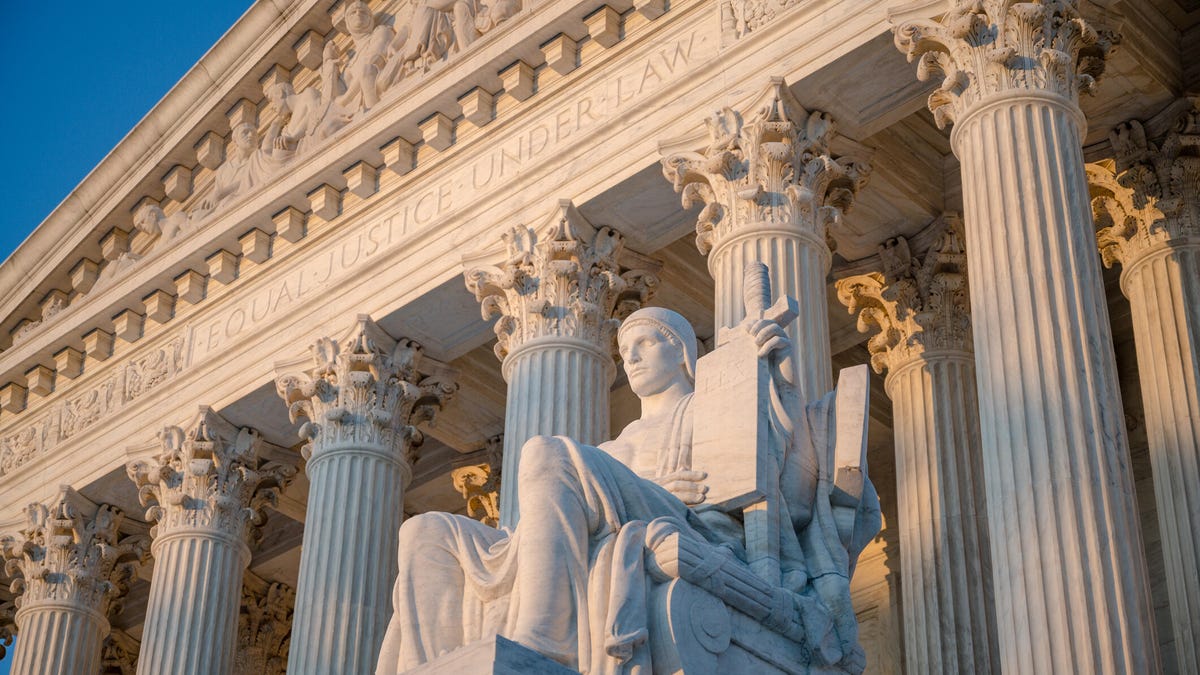Supreme Court sides with cheerleader in free speech case
The case stems from a Pennsylvania high school cheerleader's obscenity-laced Snapchat message that she posted off campus.

The Supreme Court makes a First Amendment ruling.
Editors' note: This court case focuses on social media posts that contain language some readers might find offensive.
The US Supreme Court ruled Wednesday that Pennsylvania public school officials violated a high school cheerleader's First Amendment rights by suspending her for a vulgar off-campus rant on Snapchat, a landmark case that'll impact how students use social media. In an 8-1 ruling in the case, Mahanoy v. B.L., the court said the student's Snapchat post was entitled to First Amendment protection.
"It's certainly a cautionary ruling that schools can't assume they have the same power over online speech that they do on campus during school hours," said Frank LoMonte, director of the Brechner Center for Freedom of Information at the University of Florida. "It's clear that the overwhelming majority of justices are skeptical of handing schools a blank check of punitive authority that follows students everywhere 24/7."
The case stemmed from an obscenity-laden Snapchat message that Brandi Levy, a Pennsylvania high school cheerleader, shared in 2017 after she failed to make the varsity squad. At the time, Levy was a freshman and a member of the junior varsity cheerleading team at Mahanoy Area High School. She posted the Snapchat message on a Saturday from a convenience store in Mahanoy City.
"Fuck school fuck softball fuck cheer fuck everything," Levy wrote in a Snapchat message that included a photo in which she and a classmate held up their middle fingers. Levy shared the message with about 250 friends on the app, which allows you to post content that vanishes after 24 hours. School officials learned about Levy's message after a student took a screenshot of it and shared it with her mother. The school suspended Levy from cheerleading for a year for violating the team's rules against "foul language and inappropriate gestures" and posting "any negative information regarding cheerleading, cheerleaders or coaches placed on the internet."
Levy, through her parents and backed by the American Civil Liberties Union, sued the school district, and she was allowed back on the cheerleading squad. The school district, however, appealed to the US Court of Appeals for the 3rd Circuit. That court also sided with the student, noting that Levy sent her Snapchat message while she was off campus, and it argued that suspending her violated the First Amendment.
In its ruling Wednesday, the Supreme Court said it wasn't aiming to set a broad First Amendment rule on what counts as "off campus" speech and when such speech has to yield to a school's special need to prevent substantial disruption of learning activities or to intervene when bullying occurs.
"This had the potential to be a devastatingly bad decision for students," LoMonte said. The Supreme Court "had the opportunity to say that social media is a game changer that requires rewriting the rules of the First Amendment, and they refused to do that."
Among the factors that limited the school's authority in this matter, the court noted, Levy "transmitted her speech through a personal cellphone, to an audience consisting of her private circle of Snapchat friends. These features of her speech, while risking transmission to the school itself, nonetheless ... diminish the school's interest in punishing B. L.'s utterance." Levy also didn't identify the school or specific people in her social media post and the Supreme Court said there isn't any evidence her Snapchat message substantially disrupted school.
Justice Clarence Thomas in his lone dissent said that the majority failed to consider if schools will often have more authority over speech posted on social media. Since off-campus speech shared on social media can rapidly reach "countless" people, "it often will have a greater proximate tendency to harm the school environment than will an off-campus in-person conversation," he wrote.
The highly watched case drew on a historic 1969 Supreme Court decision that said students don't lose their First Amendment rights when they step onto school property. That case, known as Tinker v. Des Moines, however, found that educators can suppress on-campus student speech if it causes a substantial disruption to school.
Levy's case focused on whether the Tinker ruling applied to off-campus speech. The 3rd Circuit Appeals Court had earlier ruled that the precedent, set more than half a century ago during the Vietnam War, didn't apply to off-campus speech.
Justice Stephen Breyer, who wrote the majority opinion, said that while the court agrees the school district wrongly punished Levy for her Snapchat post, it disagreed with the reasoning provided by the appeals court.
"We do not believe the special characteristics that give schools additional license to regulate student speech always disappear when a school regulates speech that takes place off campus," Breyer wrote. "The school's regulatory interests remain significant in some off-campus circumstances."
The Pennsylvania school district asked the Supreme Court to hear the case. In a brief, school officials said the ubiquity of smartphones , social media and the rise of remote learning during the coronavirus pandemic has blurred the lines between on- and off-campus speech. Schools have long regulated off-campus speech and the Third Circuit's decision would undermine their ability to address harassment, abuse and other disruptive speech that happens off school grounds.
David Cole, an American Civil Liberties Union lawyer, told the Supreme Court justices in April that extending the Tinker decision to include off-campus speech would "require students to effectively carry the schoolhouse on their backs in terms of speech rights everywhere they go." (PDF) Cole also said it would interfere with parenting at home. "For young people, the ability to voice their emotions to friends without fear of school censorship may be the most important freedom of all," he told the justices.

